Workplace Relations: Tesco's Stakeholders, Law & Engagement Analysis
VerifiedAdded on 2023/06/16
|11
|3194
|270
Report
AI Summary
This report provides a comprehensive analysis of employee relations within Tesco, a British multinational grocery and retail company. It explores the value and importance of employee relations, examining how positive relationships contribute to worker loyalty, motivation, and reduced workplace conflict. The report details fundamental aspects of UK employment law, including the Equality Act 2010, National Minimum Wage Act 1998, and Health and Safety at Work Act 1974, outlining the rights, duties, and obligations of both employers and employees. A stakeholder analysis identifies key stakeholders such as investors, government, employees, and trade unions, assessing their contributions to employment engagement. Finally, the report analyzes the impact of both positive and negative employee relations on these stakeholders, highlighting how a positive working environment benefits employees and the company's reputation, while negative relations can hinder productivity and stakeholder satisfaction. This document is available on Desklib, a platform offering a range of study tools and resources for students.
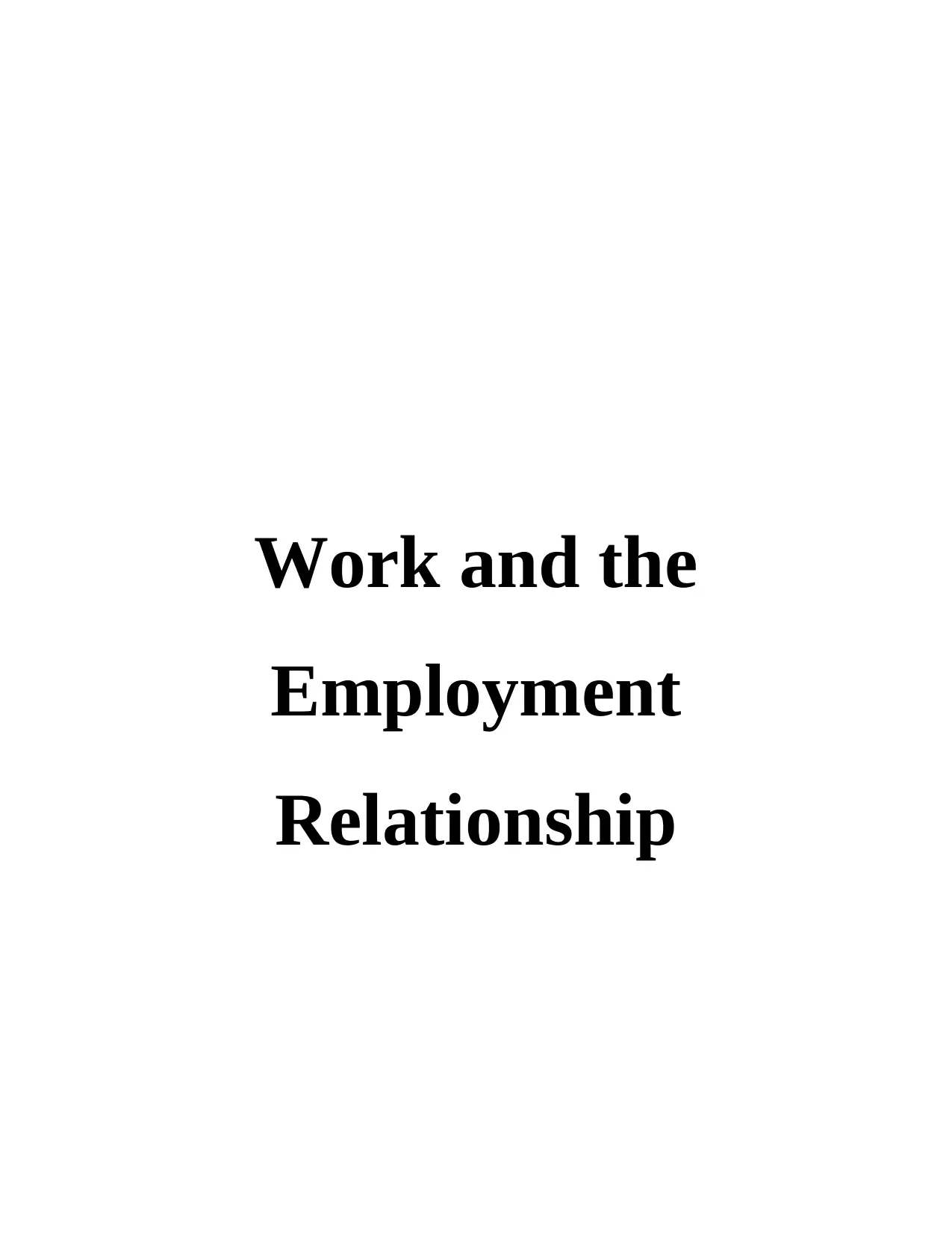
Work and the
Employment
Relationship
Employment
Relationship
Paraphrase This Document
Need a fresh take? Get an instant paraphrase of this document with our AI Paraphraser
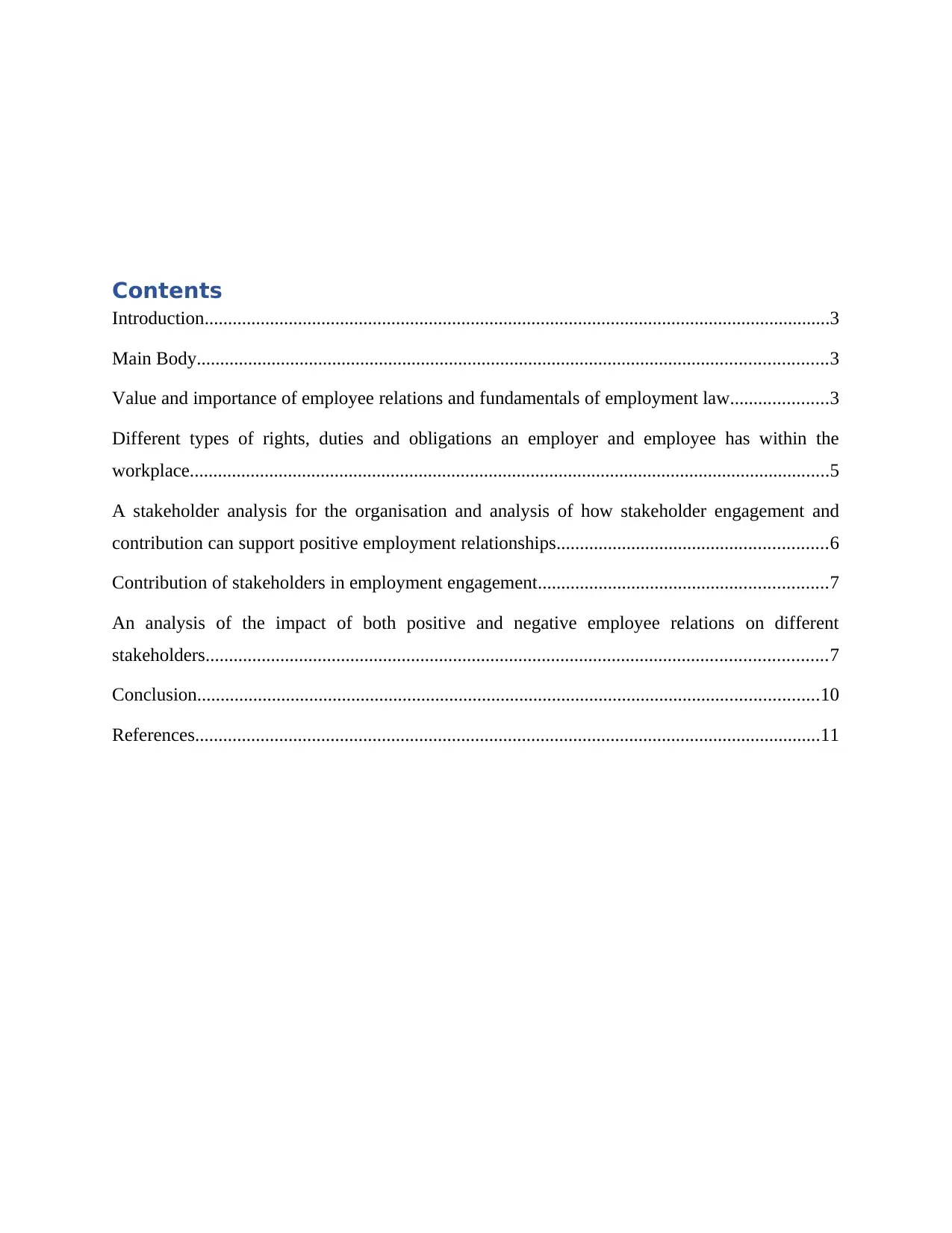
Contents
Introduction......................................................................................................................................3
Main Body.......................................................................................................................................3
Value and importance of employee relations and fundamentals of employment law.....................3
Different types of rights, duties and obligations an employer and employee has within the
workplace.........................................................................................................................................5
A stakeholder analysis for the organisation and analysis of how stakeholder engagement and
contribution can support positive employment relationships..........................................................6
Contribution of stakeholders in employment engagement..............................................................7
An analysis of the impact of both positive and negative employee relations on different
stakeholders.....................................................................................................................................7
Conclusion.....................................................................................................................................10
References......................................................................................................................................11
Introduction......................................................................................................................................3
Main Body.......................................................................................................................................3
Value and importance of employee relations and fundamentals of employment law.....................3
Different types of rights, duties and obligations an employer and employee has within the
workplace.........................................................................................................................................5
A stakeholder analysis for the organisation and analysis of how stakeholder engagement and
contribution can support positive employment relationships..........................................................6
Contribution of stakeholders in employment engagement..............................................................7
An analysis of the impact of both positive and negative employee relations on different
stakeholders.....................................................................................................................................7
Conclusion.....................................................................................................................................10
References......................................................................................................................................11
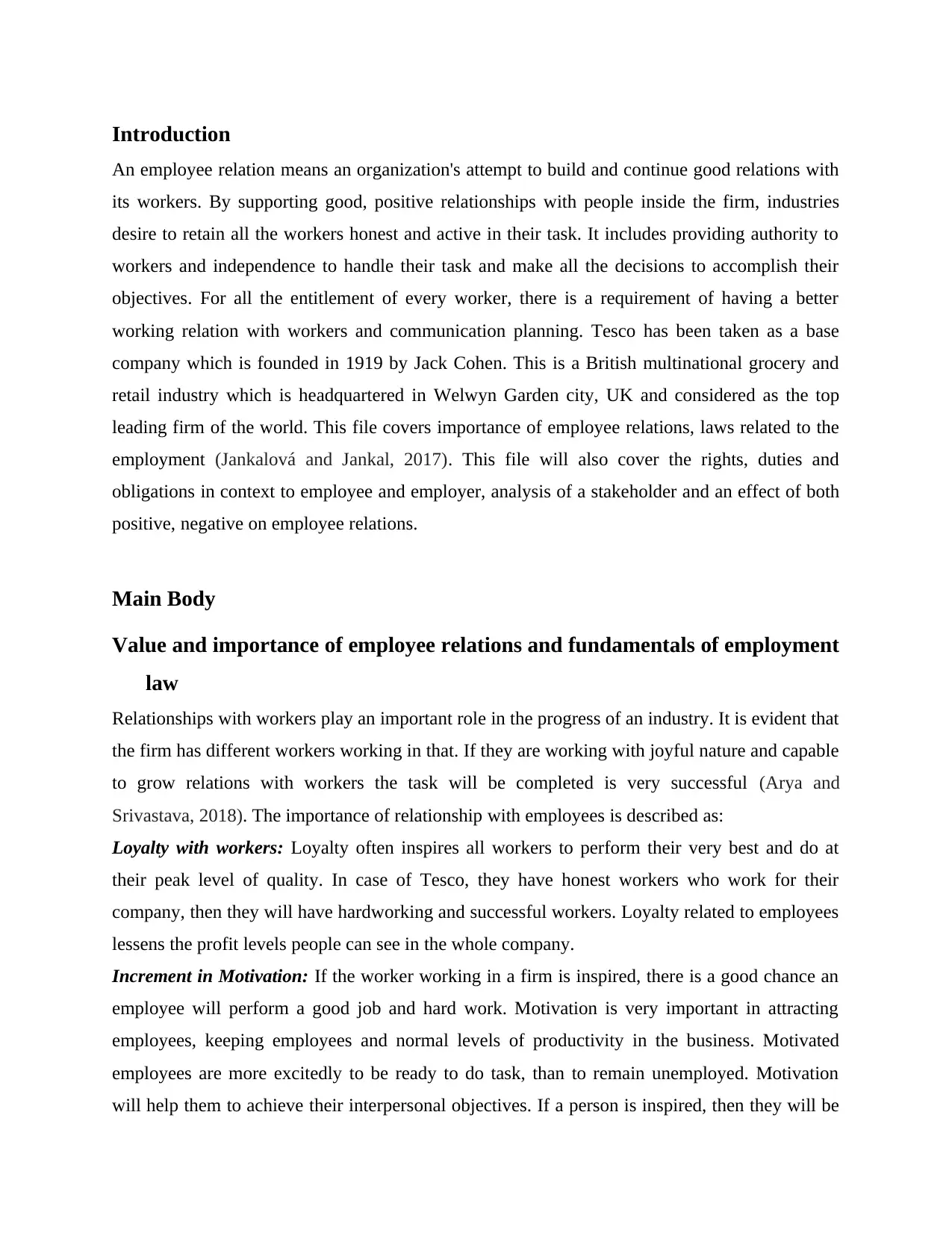
Introduction
An employee relation means an organization's attempt to build and continue good relations with
its workers. By supporting good, positive relationships with people inside the firm, industries
desire to retain all the workers honest and active in their task. It includes providing authority to
workers and independence to handle their task and make all the decisions to accomplish their
objectives. For all the entitlement of every worker, there is a requirement of having a better
working relation with workers and communication planning. Tesco has been taken as a base
company which is founded in 1919 by Jack Cohen. This is a British multinational grocery and
retail industry which is headquartered in Welwyn Garden city, UK and considered as the top
leading firm of the world. This file covers importance of employee relations, laws related to the
employment (Jankalová and Jankal, 2017). This file will also cover the rights, duties and
obligations in context to employee and employer, analysis of a stakeholder and an effect of both
positive, negative on employee relations.
Main Body
Value and importance of employee relations and fundamentals of employment
law
Relationships with workers play an important role in the progress of an industry. It is evident that
the firm has different workers working in that. If they are working with joyful nature and capable
to grow relations with workers the task will be completed is very successful (Arya and
Srivastava, 2018). The importance of relationship with employees is described as:
Loyalty with workers: Loyalty often inspires all workers to perform their very best and do at
their peak level of quality. In case of Tesco, they have honest workers who work for their
company, then they will have hardworking and successful workers. Loyalty related to employees
lessens the profit levels people can see in the whole company.
Increment in Motivation: If the worker working in a firm is inspired, there is a good chance an
employee will perform a good job and hard work. Motivation is very important in attracting
employees, keeping employees and normal levels of productivity in the business. Motivated
employees are more excitedly to be ready to do task, than to remain unemployed. Motivation
will help them to achieve their interpersonal objectives. If a person is inspired, then they will be
An employee relation means an organization's attempt to build and continue good relations with
its workers. By supporting good, positive relationships with people inside the firm, industries
desire to retain all the workers honest and active in their task. It includes providing authority to
workers and independence to handle their task and make all the decisions to accomplish their
objectives. For all the entitlement of every worker, there is a requirement of having a better
working relation with workers and communication planning. Tesco has been taken as a base
company which is founded in 1919 by Jack Cohen. This is a British multinational grocery and
retail industry which is headquartered in Welwyn Garden city, UK and considered as the top
leading firm of the world. This file covers importance of employee relations, laws related to the
employment (Jankalová and Jankal, 2017). This file will also cover the rights, duties and
obligations in context to employee and employer, analysis of a stakeholder and an effect of both
positive, negative on employee relations.
Main Body
Value and importance of employee relations and fundamentals of employment
law
Relationships with workers play an important role in the progress of an industry. It is evident that
the firm has different workers working in that. If they are working with joyful nature and capable
to grow relations with workers the task will be completed is very successful (Arya and
Srivastava, 2018). The importance of relationship with employees is described as:
Loyalty with workers: Loyalty often inspires all workers to perform their very best and do at
their peak level of quality. In case of Tesco, they have honest workers who work for their
company, then they will have hardworking and successful workers. Loyalty related to employees
lessens the profit levels people can see in the whole company.
Increment in Motivation: If the worker working in a firm is inspired, there is a good chance an
employee will perform a good job and hard work. Motivation is very important in attracting
employees, keeping employees and normal levels of productivity in the business. Motivated
employees are more excitedly to be ready to do task, than to remain unemployed. Motivation
will help them to achieve their interpersonal objectives. If a person is inspired, then they will be
⊘ This is a preview!⊘
Do you want full access?
Subscribe today to unlock all pages.

Trusted by 1+ million students worldwide
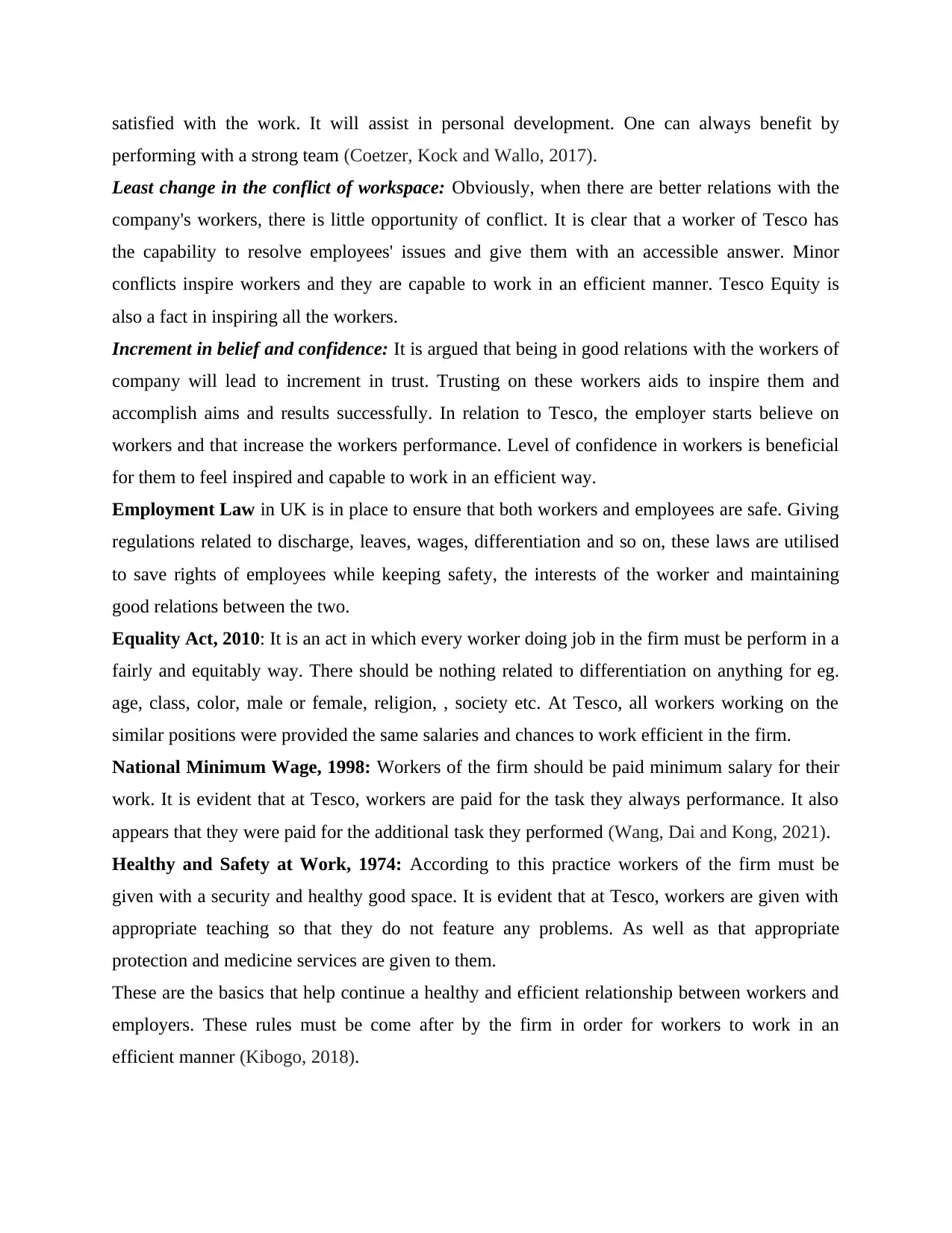
satisfied with the work. It will assist in personal development. One can always benefit by
performing with a strong team (Coetzer, Kock and Wallo, 2017).
Least change in the conflict of workspace: Obviously, when there are better relations with the
company's workers, there is little opportunity of conflict. It is clear that a worker of Tesco has
the capability to resolve employees' issues and give them with an accessible answer. Minor
conflicts inspire workers and they are capable to work in an efficient manner. Tesco Equity is
also a fact in inspiring all the workers.
Increment in belief and confidence: It is argued that being in good relations with the workers of
company will lead to increment in trust. Trusting on these workers aids to inspire them and
accomplish aims and results successfully. In relation to Tesco, the employer starts believe on
workers and that increase the workers performance. Level of confidence in workers is beneficial
for them to feel inspired and capable to work in an efficient way.
Employment Law in UK is in place to ensure that both workers and employees are safe. Giving
regulations related to discharge, leaves, wages, differentiation and so on, these laws are utilised
to save rights of employees while keeping safety, the interests of the worker and maintaining
good relations between the two.
Equality Act, 2010: It is an act in which every worker doing job in the firm must be perform in a
fairly and equitably way. There should be nothing related to differentiation on anything for eg.
age, class, color, male or female, religion, , society etc. At Tesco, all workers working on the
similar positions were provided the same salaries and chances to work efficient in the firm.
National Minimum Wage, 1998: Workers of the firm should be paid minimum salary for their
work. It is evident that at Tesco, workers are paid for the task they always performance. It also
appears that they were paid for the additional task they performed (Wang, Dai and Kong, 2021).
Healthy and Safety at Work, 1974: According to this practice workers of the firm must be
given with a security and healthy good space. It is evident that at Tesco, workers are given with
appropriate teaching so that they do not feature any problems. As well as that appropriate
protection and medicine services are given to them.
These are the basics that help continue a healthy and efficient relationship between workers and
employers. These rules must be come after by the firm in order for workers to work in an
efficient manner (Kibogo, 2018).
performing with a strong team (Coetzer, Kock and Wallo, 2017).
Least change in the conflict of workspace: Obviously, when there are better relations with the
company's workers, there is little opportunity of conflict. It is clear that a worker of Tesco has
the capability to resolve employees' issues and give them with an accessible answer. Minor
conflicts inspire workers and they are capable to work in an efficient manner. Tesco Equity is
also a fact in inspiring all the workers.
Increment in belief and confidence: It is argued that being in good relations with the workers of
company will lead to increment in trust. Trusting on these workers aids to inspire them and
accomplish aims and results successfully. In relation to Tesco, the employer starts believe on
workers and that increase the workers performance. Level of confidence in workers is beneficial
for them to feel inspired and capable to work in an efficient way.
Employment Law in UK is in place to ensure that both workers and employees are safe. Giving
regulations related to discharge, leaves, wages, differentiation and so on, these laws are utilised
to save rights of employees while keeping safety, the interests of the worker and maintaining
good relations between the two.
Equality Act, 2010: It is an act in which every worker doing job in the firm must be perform in a
fairly and equitably way. There should be nothing related to differentiation on anything for eg.
age, class, color, male or female, religion, , society etc. At Tesco, all workers working on the
similar positions were provided the same salaries and chances to work efficient in the firm.
National Minimum Wage, 1998: Workers of the firm should be paid minimum salary for their
work. It is evident that at Tesco, workers are paid for the task they always performance. It also
appears that they were paid for the additional task they performed (Wang, Dai and Kong, 2021).
Healthy and Safety at Work, 1974: According to this practice workers of the firm must be
given with a security and healthy good space. It is evident that at Tesco, workers are given with
appropriate teaching so that they do not feature any problems. As well as that appropriate
protection and medicine services are given to them.
These are the basics that help continue a healthy and efficient relationship between workers and
employers. These rules must be come after by the firm in order for workers to work in an
efficient manner (Kibogo, 2018).
Paraphrase This Document
Need a fresh take? Get an instant paraphrase of this document with our AI Paraphraser
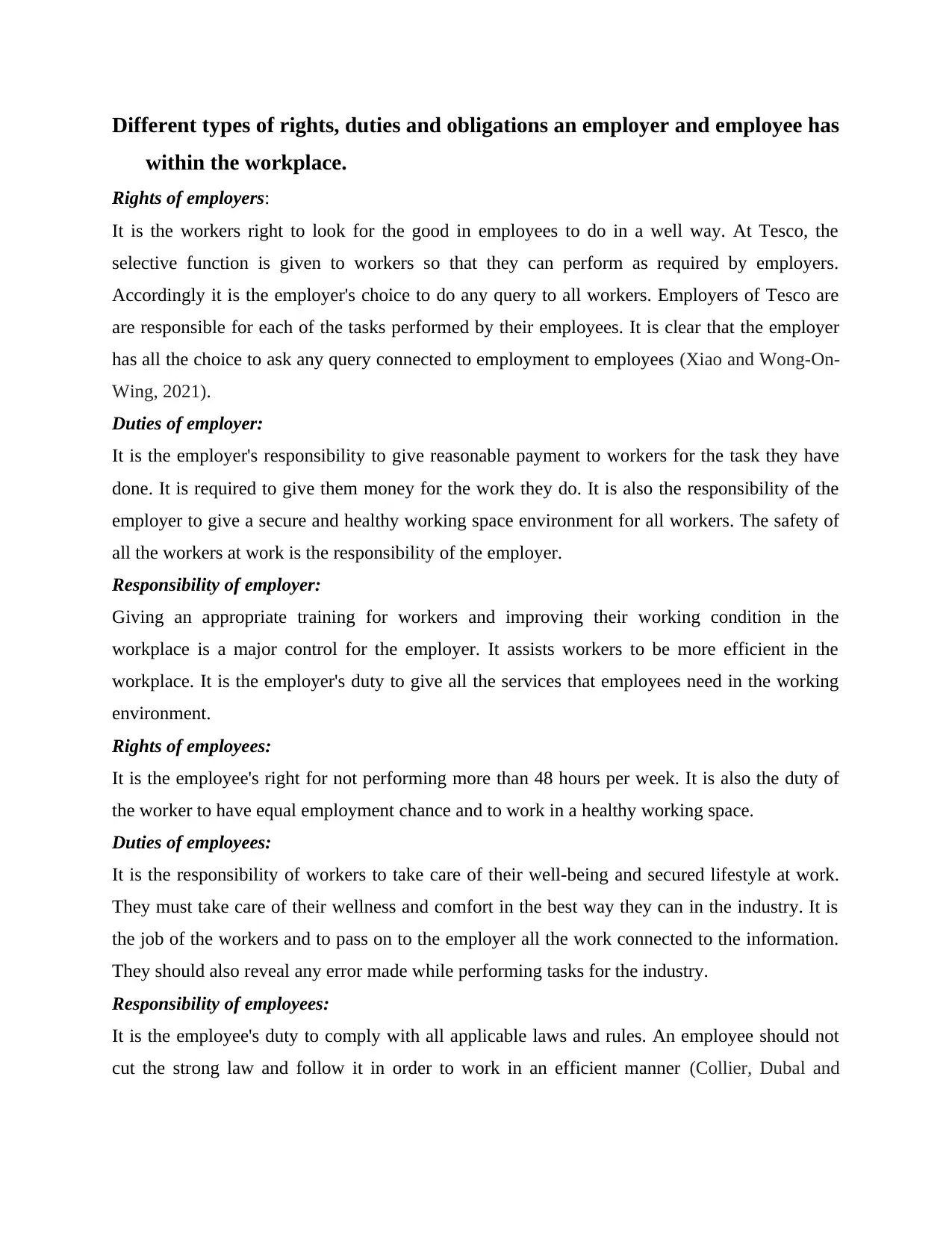
Different types of rights, duties and obligations an employer and employee has
within the workplace.
Rights of employers:
It is the workers right to look for the good in employees to do in a well way. At Tesco, the
selective function is given to workers so that they can perform as required by employers.
Accordingly it is the employer's choice to do any query to all workers. Employers of Tesco are
are responsible for each of the tasks performed by their employees. It is clear that the employer
has all the choice to ask any query connected to employment to employees (Xiao and Wong-On-
Wing, 2021).
Duties of employer:
It is the employer's responsibility to give reasonable payment to workers for the task they have
done. It is required to give them money for the work they do. It is also the responsibility of the
employer to give a secure and healthy working space environment for all workers. The safety of
all the workers at work is the responsibility of the employer.
Responsibility of employer:
Giving an appropriate training for workers and improving their working condition in the
workplace is a major control for the employer. It assists workers to be more efficient in the
workplace. It is the employer's duty to give all the services that employees need in the working
environment.
Rights of employees:
It is the employee's right for not performing more than 48 hours per week. It is also the duty of
the worker to have equal employment chance and to work in a healthy working space.
Duties of employees:
It is the responsibility of workers to take care of their well-being and secured lifestyle at work.
They must take care of their wellness and comfort in the best way they can in the industry. It is
the job of the workers and to pass on to the employer all the work connected to the information.
They should also reveal any error made while performing tasks for the industry.
Responsibility of employees:
It is the employee's duty to comply with all applicable laws and rules. An employee should not
cut the strong law and follow it in order to work in an efficient manner (Collier, Dubal and
within the workplace.
Rights of employers:
It is the workers right to look for the good in employees to do in a well way. At Tesco, the
selective function is given to workers so that they can perform as required by employers.
Accordingly it is the employer's choice to do any query to all workers. Employers of Tesco are
are responsible for each of the tasks performed by their employees. It is clear that the employer
has all the choice to ask any query connected to employment to employees (Xiao and Wong-On-
Wing, 2021).
Duties of employer:
It is the employer's responsibility to give reasonable payment to workers for the task they have
done. It is required to give them money for the work they do. It is also the responsibility of the
employer to give a secure and healthy working space environment for all workers. The safety of
all the workers at work is the responsibility of the employer.
Responsibility of employer:
Giving an appropriate training for workers and improving their working condition in the
workplace is a major control for the employer. It assists workers to be more efficient in the
workplace. It is the employer's duty to give all the services that employees need in the working
environment.
Rights of employees:
It is the employee's right for not performing more than 48 hours per week. It is also the duty of
the worker to have equal employment chance and to work in a healthy working space.
Duties of employees:
It is the responsibility of workers to take care of their well-being and secured lifestyle at work.
They must take care of their wellness and comfort in the best way they can in the industry. It is
the job of the workers and to pass on to the employer all the work connected to the information.
They should also reveal any error made while performing tasks for the industry.
Responsibility of employees:
It is the employee's duty to comply with all applicable laws and rules. An employee should not
cut the strong law and follow it in order to work in an efficient manner (Collier, Dubal and
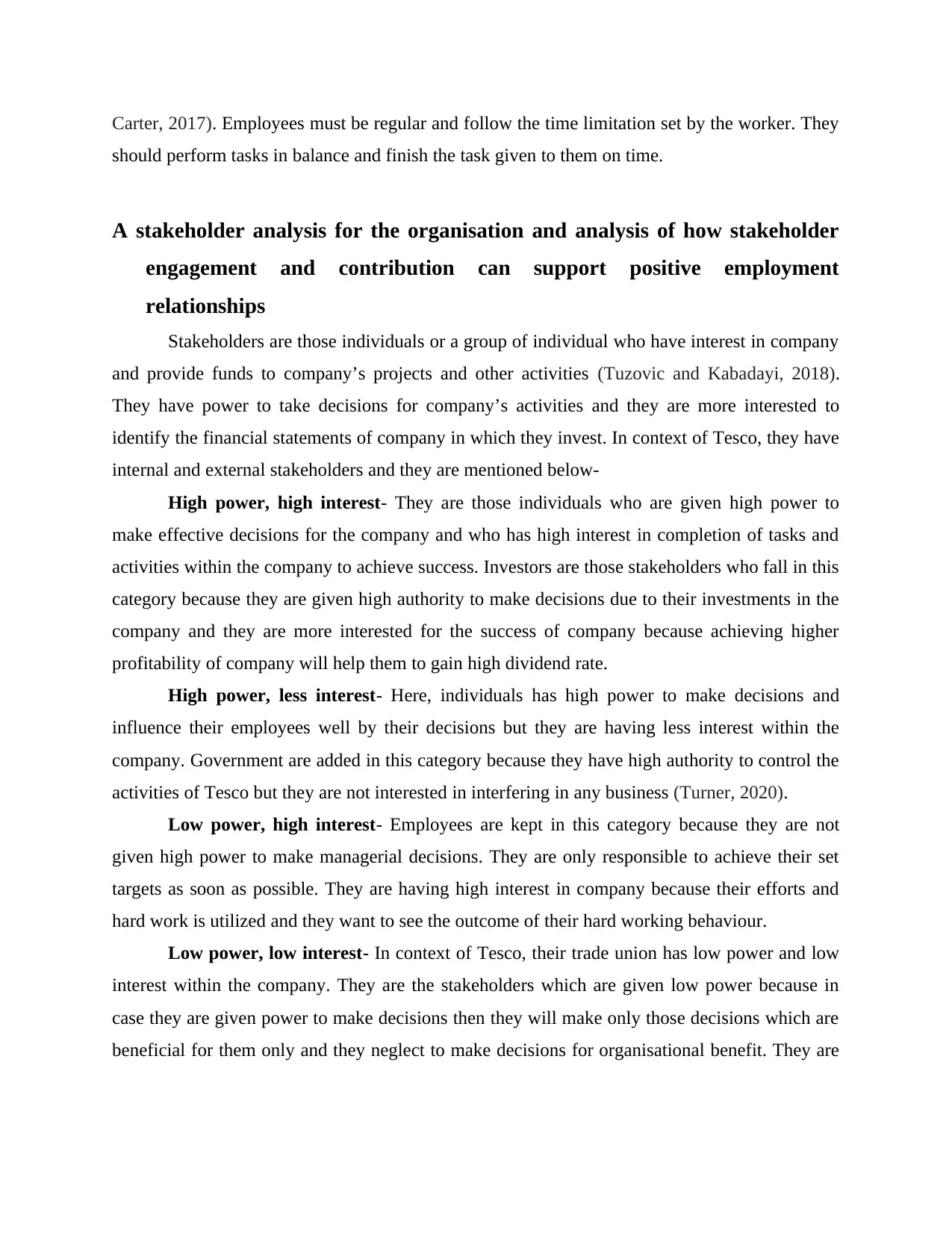
Carter, 2017). Employees must be regular and follow the time limitation set by the worker. They
should perform tasks in balance and finish the task given to them on time.
A stakeholder analysis for the organisation and analysis of how stakeholder
engagement and contribution can support positive employment
relationships
Stakeholders are those individuals or a group of individual who have interest in company
and provide funds to company’s projects and other activities (Tuzovic and Kabadayi, 2018).
They have power to take decisions for company’s activities and they are more interested to
identify the financial statements of company in which they invest. In context of Tesco, they have
internal and external stakeholders and they are mentioned below-
High power, high interest- They are those individuals who are given high power to
make effective decisions for the company and who has high interest in completion of tasks and
activities within the company to achieve success. Investors are those stakeholders who fall in this
category because they are given high authority to make decisions due to their investments in the
company and they are more interested for the success of company because achieving higher
profitability of company will help them to gain high dividend rate.
High power, less interest- Here, individuals has high power to make decisions and
influence their employees well by their decisions but they are having less interest within the
company. Government are added in this category because they have high authority to control the
activities of Tesco but they are not interested in interfering in any business (Turner, 2020).
Low power, high interest- Employees are kept in this category because they are not
given high power to make managerial decisions. They are only responsible to achieve their set
targets as soon as possible. They are having high interest in company because their efforts and
hard work is utilized and they want to see the outcome of their hard working behaviour.
Low power, low interest- In context of Tesco, their trade union has low power and low
interest within the company. They are the stakeholders which are given low power because in
case they are given power to make decisions then they will make only those decisions which are
beneficial for them only and they neglect to make decisions for organisational benefit. They are
should perform tasks in balance and finish the task given to them on time.
A stakeholder analysis for the organisation and analysis of how stakeholder
engagement and contribution can support positive employment
relationships
Stakeholders are those individuals or a group of individual who have interest in company
and provide funds to company’s projects and other activities (Tuzovic and Kabadayi, 2018).
They have power to take decisions for company’s activities and they are more interested to
identify the financial statements of company in which they invest. In context of Tesco, they have
internal and external stakeholders and they are mentioned below-
High power, high interest- They are those individuals who are given high power to
make effective decisions for the company and who has high interest in completion of tasks and
activities within the company to achieve success. Investors are those stakeholders who fall in this
category because they are given high authority to make decisions due to their investments in the
company and they are more interested for the success of company because achieving higher
profitability of company will help them to gain high dividend rate.
High power, less interest- Here, individuals has high power to make decisions and
influence their employees well by their decisions but they are having less interest within the
company. Government are added in this category because they have high authority to control the
activities of Tesco but they are not interested in interfering in any business (Turner, 2020).
Low power, high interest- Employees are kept in this category because they are not
given high power to make managerial decisions. They are only responsible to achieve their set
targets as soon as possible. They are having high interest in company because their efforts and
hard work is utilized and they want to see the outcome of their hard working behaviour.
Low power, low interest- In context of Tesco, their trade union has low power and low
interest within the company. They are the stakeholders which are given low power because in
case they are given power to make decisions then they will make only those decisions which are
beneficial for them only and they neglect to make decisions for organisational benefit. They are
⊘ This is a preview!⊘
Do you want full access?
Subscribe today to unlock all pages.

Trusted by 1+ million students worldwide
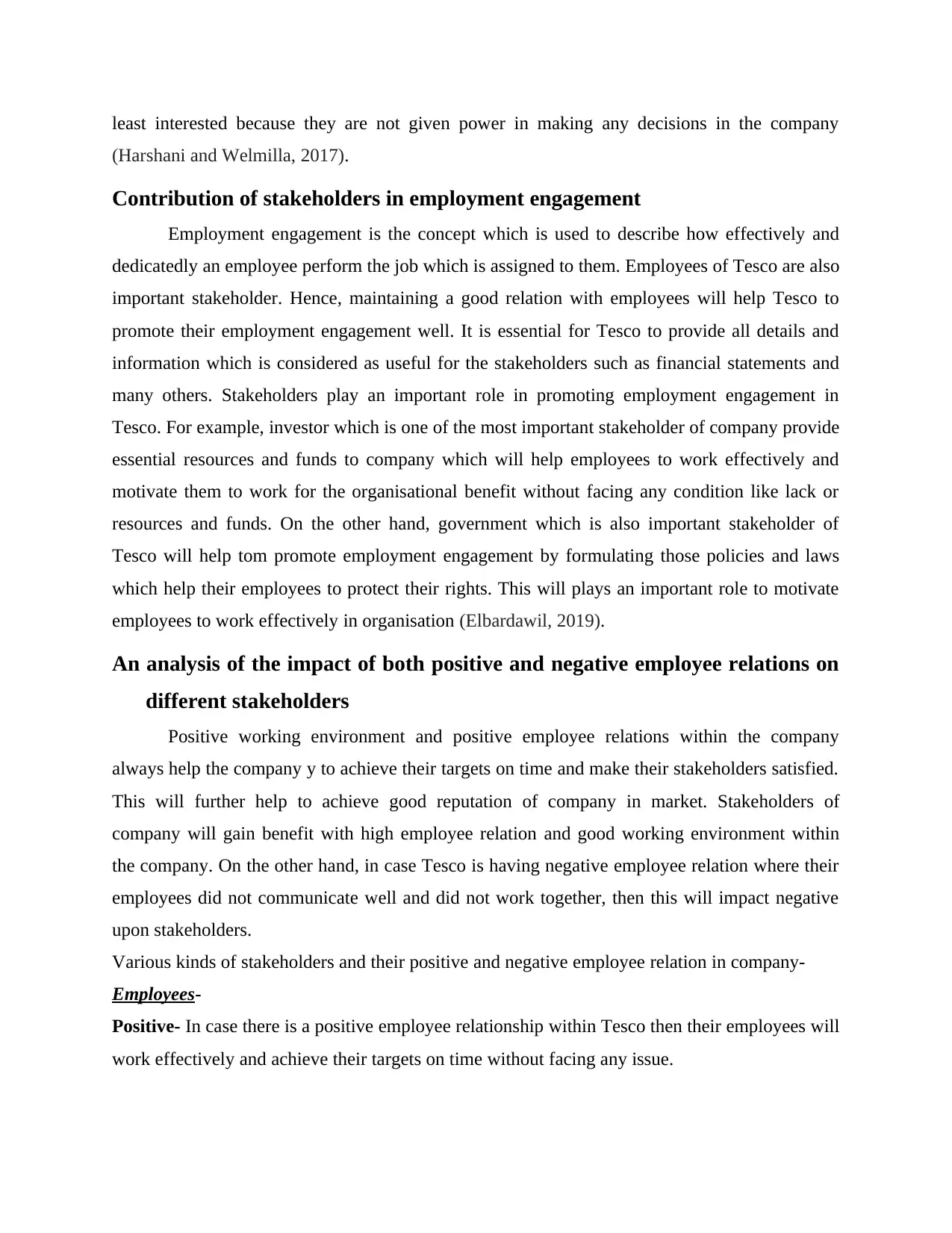
least interested because they are not given power in making any decisions in the company
(Harshani and Welmilla, 2017).
Contribution of stakeholders in employment engagement
Employment engagement is the concept which is used to describe how effectively and
dedicatedly an employee perform the job which is assigned to them. Employees of Tesco are also
important stakeholder. Hence, maintaining a good relation with employees will help Tesco to
promote their employment engagement well. It is essential for Tesco to provide all details and
information which is considered as useful for the stakeholders such as financial statements and
many others. Stakeholders play an important role in promoting employment engagement in
Tesco. For example, investor which is one of the most important stakeholder of company provide
essential resources and funds to company which will help employees to work effectively and
motivate them to work for the organisational benefit without facing any condition like lack or
resources and funds. On the other hand, government which is also important stakeholder of
Tesco will help tom promote employment engagement by formulating those policies and laws
which help their employees to protect their rights. This will plays an important role to motivate
employees to work effectively in organisation (Elbardawil, 2019).
An analysis of the impact of both positive and negative employee relations on
different stakeholders
Positive working environment and positive employee relations within the company
always help the company y to achieve their targets on time and make their stakeholders satisfied.
This will further help to achieve good reputation of company in market. Stakeholders of
company will gain benefit with high employee relation and good working environment within
the company. On the other hand, in case Tesco is having negative employee relation where their
employees did not communicate well and did not work together, then this will impact negative
upon stakeholders.
Various kinds of stakeholders and their positive and negative employee relation in company-
Employees-
Positive- In case there is a positive employee relationship within Tesco then their employees will
work effectively and achieve their targets on time without facing any issue.
(Harshani and Welmilla, 2017).
Contribution of stakeholders in employment engagement
Employment engagement is the concept which is used to describe how effectively and
dedicatedly an employee perform the job which is assigned to them. Employees of Tesco are also
important stakeholder. Hence, maintaining a good relation with employees will help Tesco to
promote their employment engagement well. It is essential for Tesco to provide all details and
information which is considered as useful for the stakeholders such as financial statements and
many others. Stakeholders play an important role in promoting employment engagement in
Tesco. For example, investor which is one of the most important stakeholder of company provide
essential resources and funds to company which will help employees to work effectively and
motivate them to work for the organisational benefit without facing any condition like lack or
resources and funds. On the other hand, government which is also important stakeholder of
Tesco will help tom promote employment engagement by formulating those policies and laws
which help their employees to protect their rights. This will plays an important role to motivate
employees to work effectively in organisation (Elbardawil, 2019).
An analysis of the impact of both positive and negative employee relations on
different stakeholders
Positive working environment and positive employee relations within the company
always help the company y to achieve their targets on time and make their stakeholders satisfied.
This will further help to achieve good reputation of company in market. Stakeholders of
company will gain benefit with high employee relation and good working environment within
the company. On the other hand, in case Tesco is having negative employee relation where their
employees did not communicate well and did not work together, then this will impact negative
upon stakeholders.
Various kinds of stakeholders and their positive and negative employee relation in company-
Employees-
Positive- In case there is a positive employee relationship within Tesco then their employees will
work effectively and achieve their targets on time without facing any issue.
Paraphrase This Document
Need a fresh take? Get an instant paraphrase of this document with our AI Paraphraser
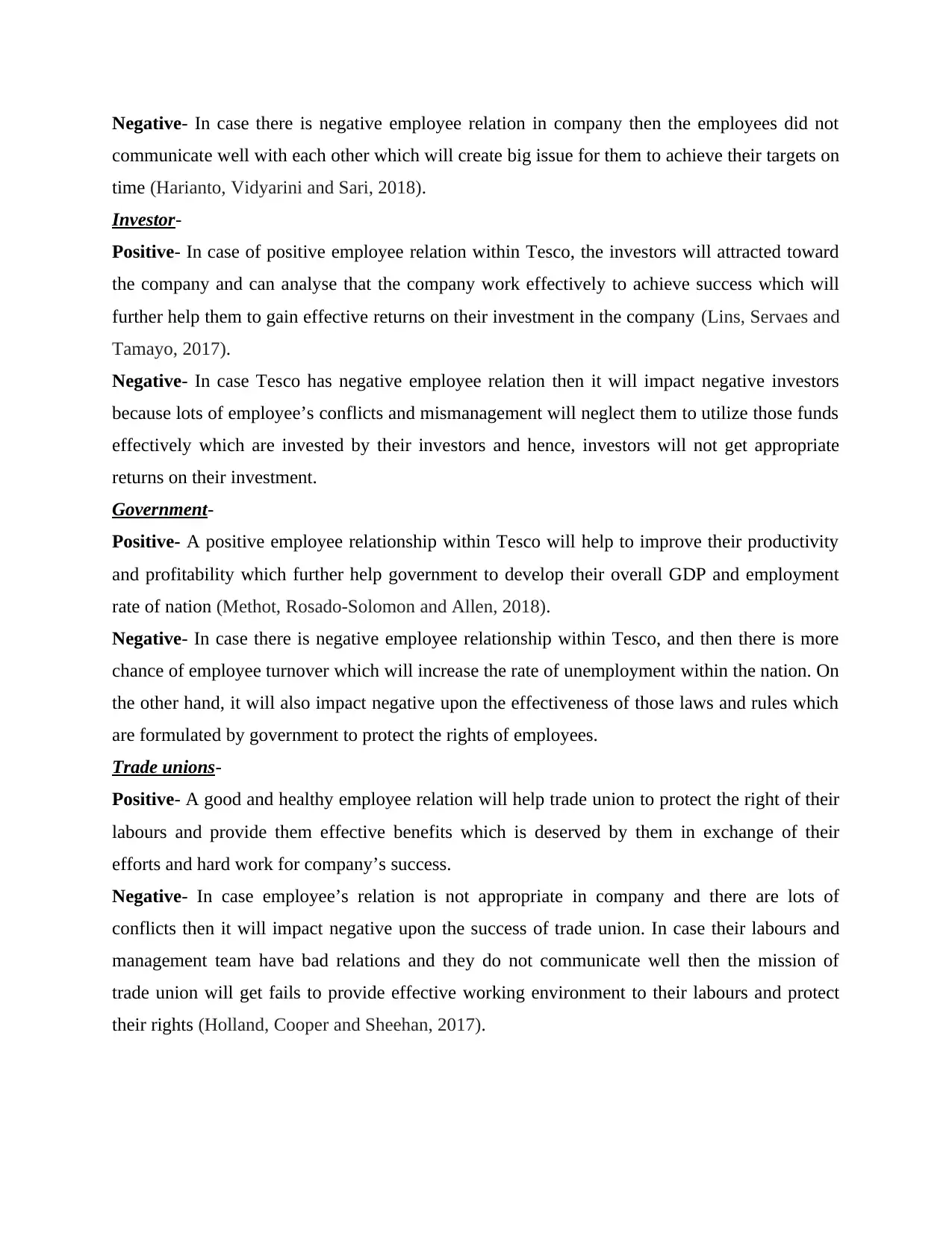
Negative- In case there is negative employee relation in company then the employees did not
communicate well with each other which will create big issue for them to achieve their targets on
time (Harianto, Vidyarini and Sari, 2018).
Investor-
Positive- In case of positive employee relation within Tesco, the investors will attracted toward
the company and can analyse that the company work effectively to achieve success which will
further help them to gain effective returns on their investment in the company (Lins, Servaes and
Tamayo, 2017).
Negative- In case Tesco has negative employee relation then it will impact negative investors
because lots of employee’s conflicts and mismanagement will neglect them to utilize those funds
effectively which are invested by their investors and hence, investors will not get appropriate
returns on their investment.
Government-
Positive- A positive employee relationship within Tesco will help to improve their productivity
and profitability which further help government to develop their overall GDP and employment
rate of nation (Methot, Rosado-Solomon and Allen, 2018).
Negative- In case there is negative employee relationship within Tesco, and then there is more
chance of employee turnover which will increase the rate of unemployment within the nation. On
the other hand, it will also impact negative upon the effectiveness of those laws and rules which
are formulated by government to protect the rights of employees.
Trade unions-
Positive- A good and healthy employee relation will help trade union to protect the right of their
labours and provide them effective benefits which is deserved by them in exchange of their
efforts and hard work for company’s success.
Negative- In case employee’s relation is not appropriate in company and there are lots of
conflicts then it will impact negative upon the success of trade union. In case their labours and
management team have bad relations and they do not communicate well then the mission of
trade union will get fails to provide effective working environment to their labours and protect
their rights (Holland, Cooper and Sheehan, 2017).
communicate well with each other which will create big issue for them to achieve their targets on
time (Harianto, Vidyarini and Sari, 2018).
Investor-
Positive- In case of positive employee relation within Tesco, the investors will attracted toward
the company and can analyse that the company work effectively to achieve success which will
further help them to gain effective returns on their investment in the company (Lins, Servaes and
Tamayo, 2017).
Negative- In case Tesco has negative employee relation then it will impact negative investors
because lots of employee’s conflicts and mismanagement will neglect them to utilize those funds
effectively which are invested by their investors and hence, investors will not get appropriate
returns on their investment.
Government-
Positive- A positive employee relationship within Tesco will help to improve their productivity
and profitability which further help government to develop their overall GDP and employment
rate of nation (Methot, Rosado-Solomon and Allen, 2018).
Negative- In case there is negative employee relationship within Tesco, and then there is more
chance of employee turnover which will increase the rate of unemployment within the nation. On
the other hand, it will also impact negative upon the effectiveness of those laws and rules which
are formulated by government to protect the rights of employees.
Trade unions-
Positive- A good and healthy employee relation will help trade union to protect the right of their
labours and provide them effective benefits which is deserved by them in exchange of their
efforts and hard work for company’s success.
Negative- In case employee’s relation is not appropriate in company and there are lots of
conflicts then it will impact negative upon the success of trade union. In case their labours and
management team have bad relations and they do not communicate well then the mission of
trade union will get fails to provide effective working environment to their labours and protect
their rights (Holland, Cooper and Sheehan, 2017).
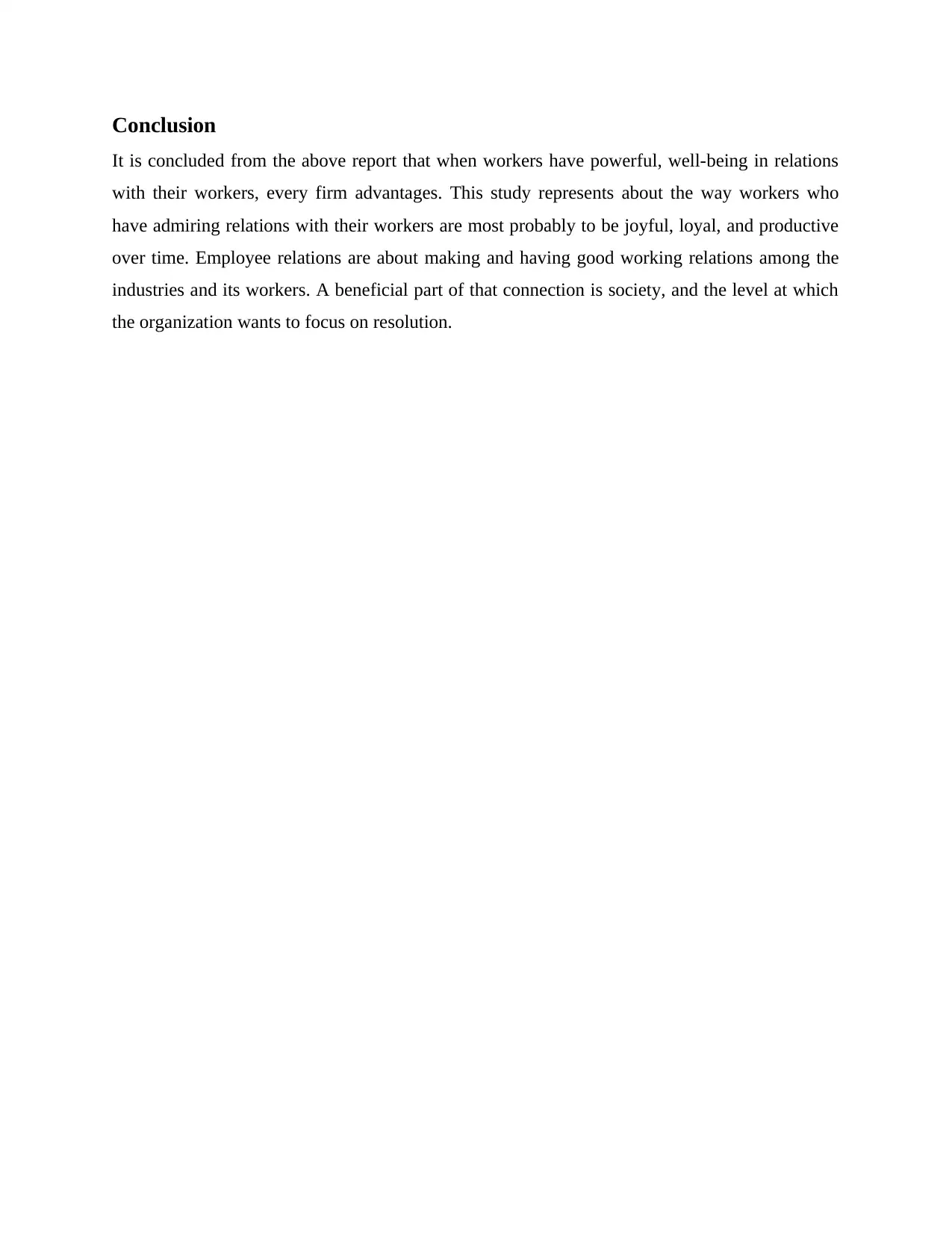
Conclusion
It is concluded from the above report that when workers have powerful, well-being in relations
with their workers, every firm advantages. This study represents about the way workers who
have admiring relations with their workers are most probably to be joyful, loyal, and productive
over time. Employee relations are about making and having good working relations among the
industries and its workers. A beneficial part of that connection is society, and the level at which
the organization wants to focus on resolution.
It is concluded from the above report that when workers have powerful, well-being in relations
with their workers, every firm advantages. This study represents about the way workers who
have admiring relations with their workers are most probably to be joyful, loyal, and productive
over time. Employee relations are about making and having good working relations among the
industries and its workers. A beneficial part of that connection is society, and the level at which
the organization wants to focus on resolution.
⊘ This is a preview!⊘
Do you want full access?
Subscribe today to unlock all pages.

Trusted by 1+ million students worldwide
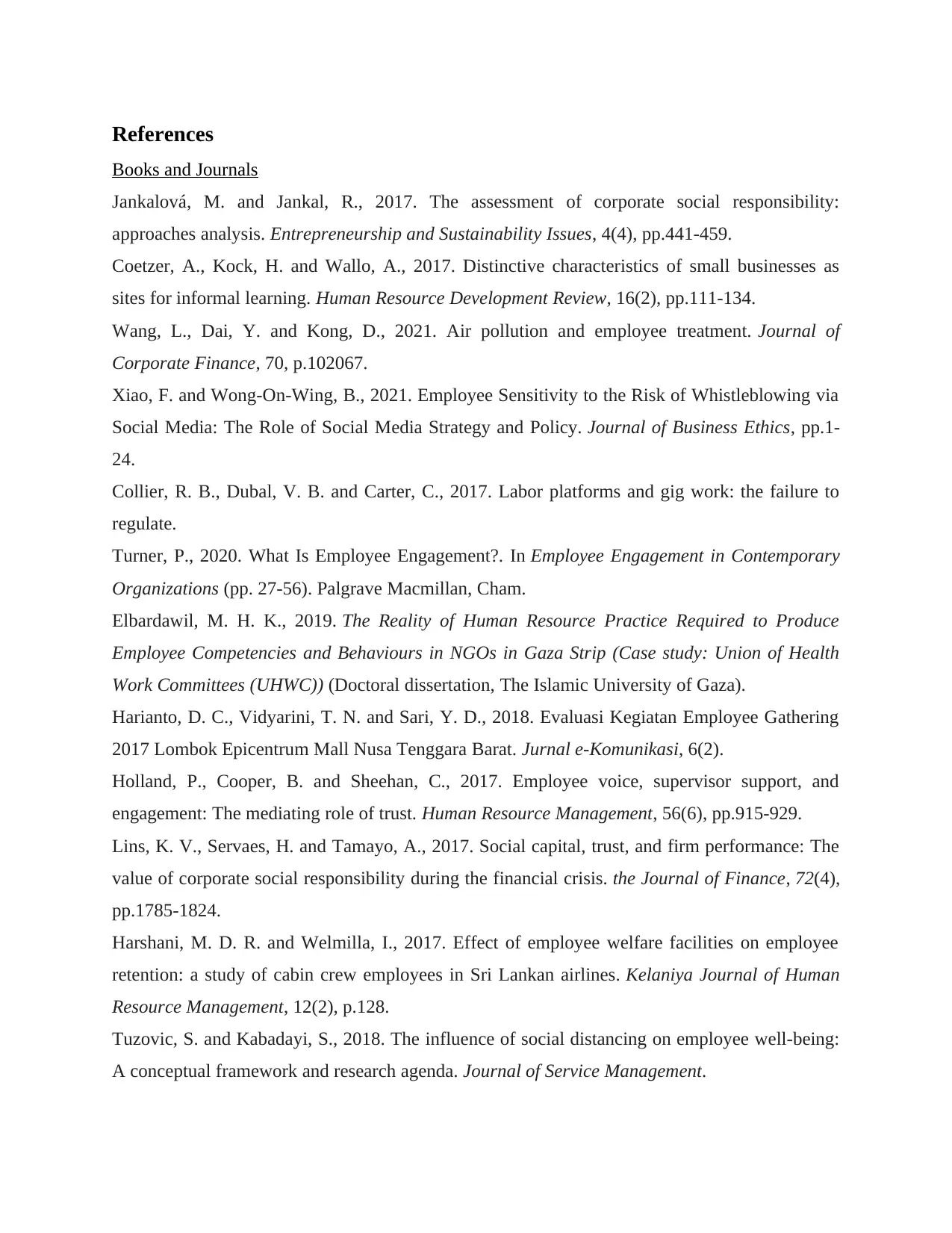
References
Books and Journals
Jankalová, M. and Jankal, R., 2017. The assessment of corporate social responsibility:
approaches analysis. Entrepreneurship and Sustainability Issues, 4(4), pp.441-459.
Coetzer, A., Kock, H. and Wallo, A., 2017. Distinctive characteristics of small businesses as
sites for informal learning. Human Resource Development Review, 16(2), pp.111-134.
Wang, L., Dai, Y. and Kong, D., 2021. Air pollution and employee treatment. Journal of
Corporate Finance, 70, p.102067.
Xiao, F. and Wong-On-Wing, B., 2021. Employee Sensitivity to the Risk of Whistleblowing via
Social Media: The Role of Social Media Strategy and Policy. Journal of Business Ethics, pp.1-
24.
Collier, R. B., Dubal, V. B. and Carter, C., 2017. Labor platforms and gig work: the failure to
regulate.
Turner, P., 2020. What Is Employee Engagement?. In Employee Engagement in Contemporary
Organizations (pp. 27-56). Palgrave Macmillan, Cham.
Elbardawil, M. H. K., 2019. The Reality of Human Resource Practice Required to Produce
Employee Competencies and Behaviours in NGOs in Gaza Strip (Case study: Union of Health
Work Committees (UHWC)) (Doctoral dissertation, The Islamic University of Gaza).
Harianto, D. C., Vidyarini, T. N. and Sari, Y. D., 2018. Evaluasi Kegiatan Employee Gathering
2017 Lombok Epicentrum Mall Nusa Tenggara Barat. Jurnal e-Komunikasi, 6(2).
Holland, P., Cooper, B. and Sheehan, C., 2017. Employee voice, supervisor support, and
engagement: The mediating role of trust. Human Resource Management, 56(6), pp.915-929.
Lins, K. V., Servaes, H. and Tamayo, A., 2017. Social capital, trust, and firm performance: The
value of corporate social responsibility during the financial crisis. the Journal of Finance, 72(4),
pp.1785-1824.
Harshani, M. D. R. and Welmilla, I., 2017. Effect of employee welfare facilities on employee
retention: a study of cabin crew employees in Sri Lankan airlines. Kelaniya Journal of Human
Resource Management, 12(2), p.128.
Tuzovic, S. and Kabadayi, S., 2018. The influence of social distancing on employee well-being:
A conceptual framework and research agenda. Journal of Service Management.
Books and Journals
Jankalová, M. and Jankal, R., 2017. The assessment of corporate social responsibility:
approaches analysis. Entrepreneurship and Sustainability Issues, 4(4), pp.441-459.
Coetzer, A., Kock, H. and Wallo, A., 2017. Distinctive characteristics of small businesses as
sites for informal learning. Human Resource Development Review, 16(2), pp.111-134.
Wang, L., Dai, Y. and Kong, D., 2021. Air pollution and employee treatment. Journal of
Corporate Finance, 70, p.102067.
Xiao, F. and Wong-On-Wing, B., 2021. Employee Sensitivity to the Risk of Whistleblowing via
Social Media: The Role of Social Media Strategy and Policy. Journal of Business Ethics, pp.1-
24.
Collier, R. B., Dubal, V. B. and Carter, C., 2017. Labor platforms and gig work: the failure to
regulate.
Turner, P., 2020. What Is Employee Engagement?. In Employee Engagement in Contemporary
Organizations (pp. 27-56). Palgrave Macmillan, Cham.
Elbardawil, M. H. K., 2019. The Reality of Human Resource Practice Required to Produce
Employee Competencies and Behaviours in NGOs in Gaza Strip (Case study: Union of Health
Work Committees (UHWC)) (Doctoral dissertation, The Islamic University of Gaza).
Harianto, D. C., Vidyarini, T. N. and Sari, Y. D., 2018. Evaluasi Kegiatan Employee Gathering
2017 Lombok Epicentrum Mall Nusa Tenggara Barat. Jurnal e-Komunikasi, 6(2).
Holland, P., Cooper, B. and Sheehan, C., 2017. Employee voice, supervisor support, and
engagement: The mediating role of trust. Human Resource Management, 56(6), pp.915-929.
Lins, K. V., Servaes, H. and Tamayo, A., 2017. Social capital, trust, and firm performance: The
value of corporate social responsibility during the financial crisis. the Journal of Finance, 72(4),
pp.1785-1824.
Harshani, M. D. R. and Welmilla, I., 2017. Effect of employee welfare facilities on employee
retention: a study of cabin crew employees in Sri Lankan airlines. Kelaniya Journal of Human
Resource Management, 12(2), p.128.
Tuzovic, S. and Kabadayi, S., 2018. The influence of social distancing on employee well-being:
A conceptual framework and research agenda. Journal of Service Management.
Paraphrase This Document
Need a fresh take? Get an instant paraphrase of this document with our AI Paraphraser
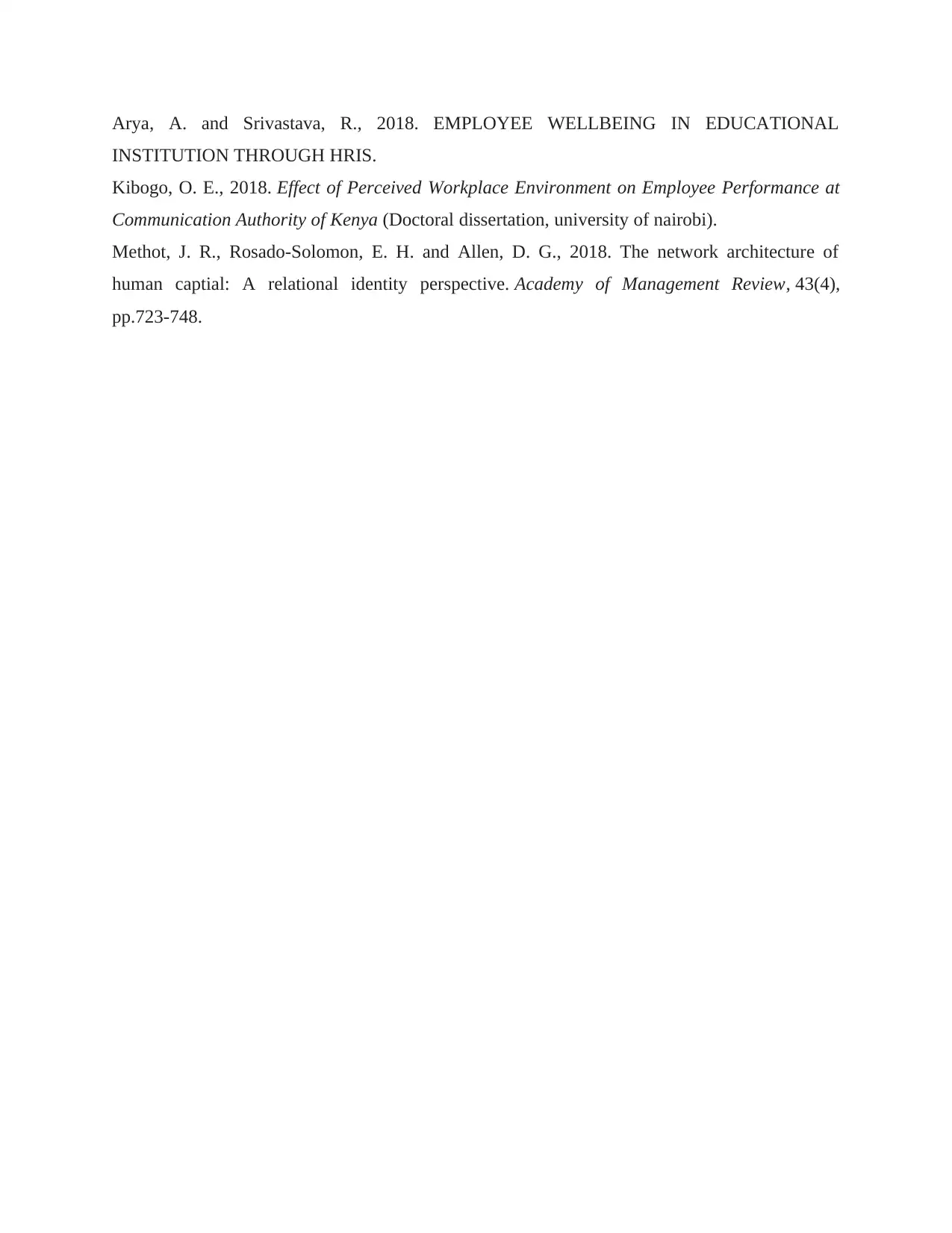
Arya, A. and Srivastava, R., 2018. EMPLOYEE WELLBEING IN EDUCATIONAL
INSTITUTION THROUGH HRIS.
Kibogo, O. E., 2018. Effect of Perceived Workplace Environment on Employee Performance at
Communication Authority of Kenya (Doctoral dissertation, university of nairobi).
Methot, J. R., Rosado-Solomon, E. H. and Allen, D. G., 2018. The network architecture of
human captial: A relational identity perspective. Academy of Management Review, 43(4),
pp.723-748.
INSTITUTION THROUGH HRIS.
Kibogo, O. E., 2018. Effect of Perceived Workplace Environment on Employee Performance at
Communication Authority of Kenya (Doctoral dissertation, university of nairobi).
Methot, J. R., Rosado-Solomon, E. H. and Allen, D. G., 2018. The network architecture of
human captial: A relational identity perspective. Academy of Management Review, 43(4),
pp.723-748.
1 out of 11
Related Documents
Your All-in-One AI-Powered Toolkit for Academic Success.
+13062052269
info@desklib.com
Available 24*7 on WhatsApp / Email
![[object Object]](/_next/static/media/star-bottom.7253800d.svg)
Unlock your academic potential
Copyright © 2020–2026 A2Z Services. All Rights Reserved. Developed and managed by ZUCOL.





